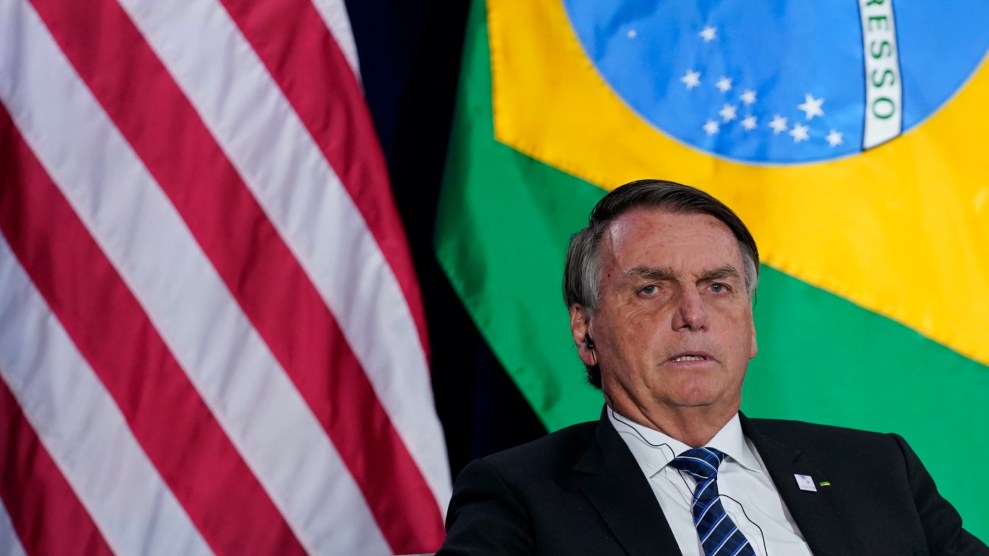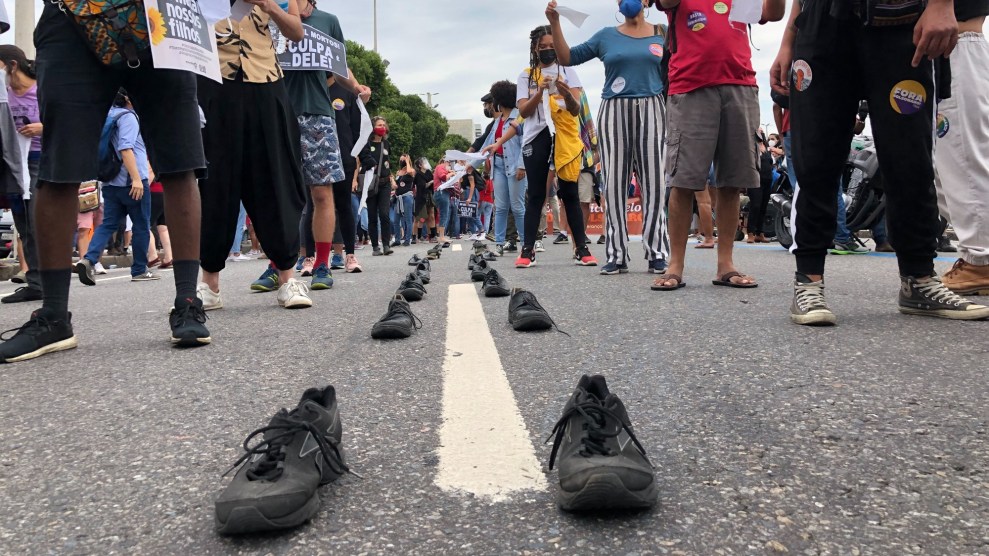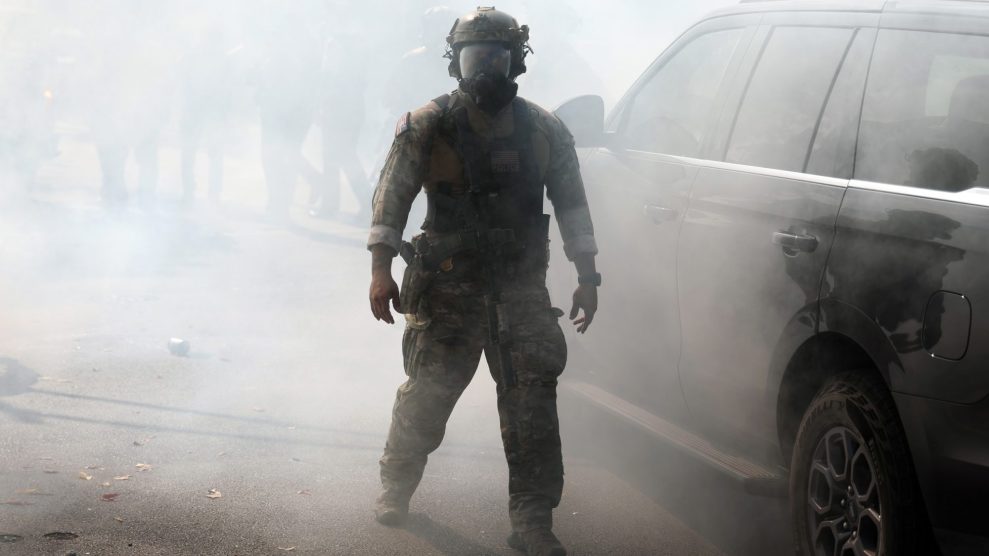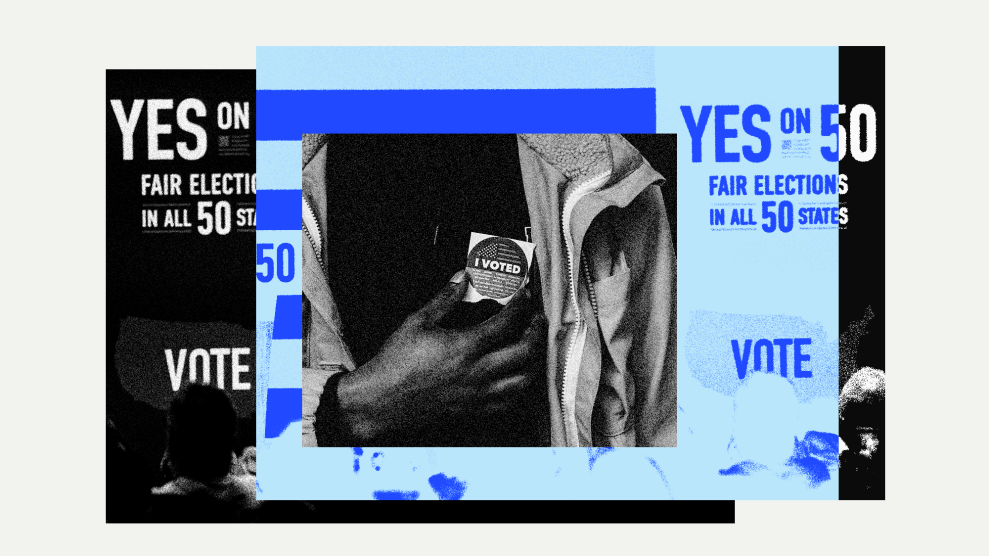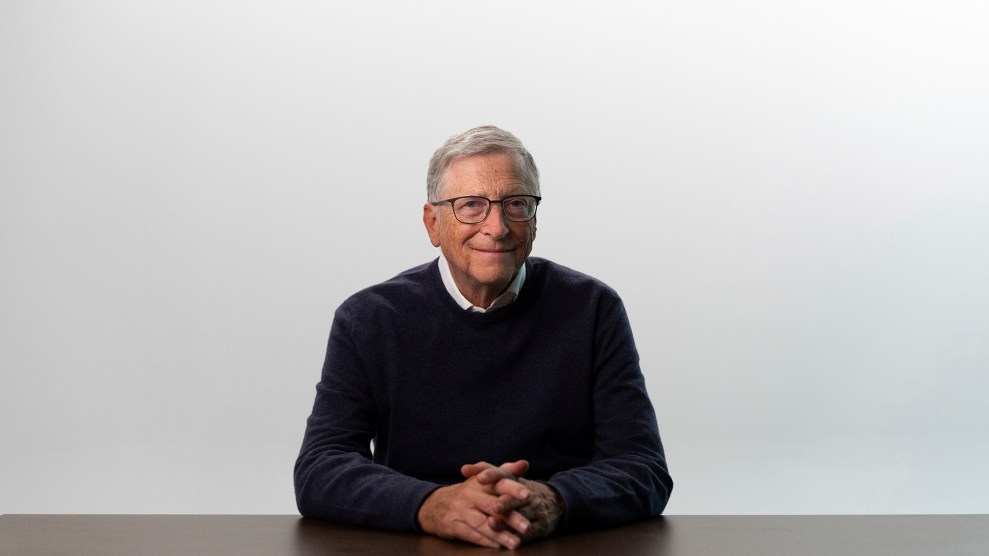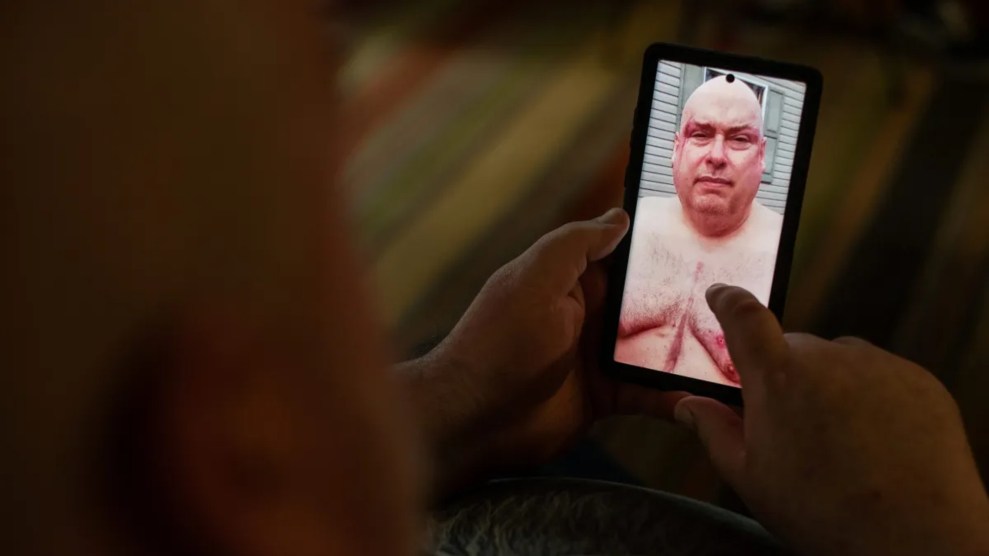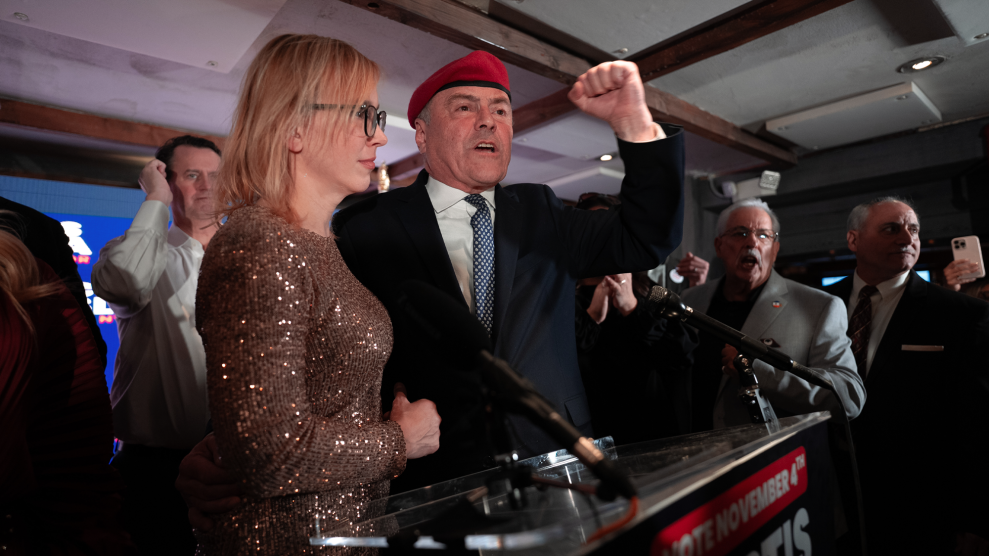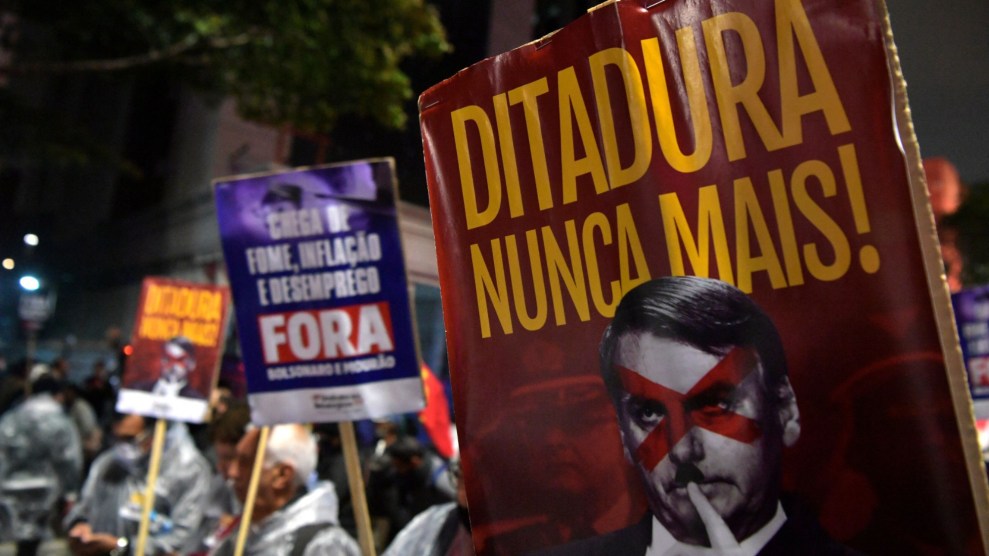
Demonstration in defense of democracy and against President Jair Bolsonaro in São Paulo.Nelson Almeida/AFP/Getty
On August 11, thousands of Brazilians gathered inside and outside of the University of São Paulo’s law school to follow along with the reading of two letters in defense of democracy. The documents, which had been signed by former presidents, artists, scholars, and businesspeople, were in response to President Jair Bolsonaro’s repeated attacks on the Supreme Court and the electoral system ahead of the October presidential elections. One of the letters took as its inspiration a 1977 “Letter to Brazilians” that denounced the military dictatorship that ruled the country at the time.
“In today’s Brazil, there is no more room for authoritarian setbacks,” states the 2022 manifesto, which has collected more than 1 million signatures. “Dictatorship and torture belong to the past. The solution to the immense challenges facing Brazilian society has to be tied to respect for the results of the elections.” The pro-democracy statement also referenced “how authoritarian follies put the United States’ century-old democracy at risk” and those “efforts to disrupt democracy and people’s faith in the reliability of the [electoral] process did not succeed, and nor will they here.”
With about a month and a half until the most polarized election in Brazil’s recent history, the most recent polls show the far-right incumbent president trailing 15 points behind his biggest rival, former President Luiz Inácio Lula da Silva from the left-leaning Worker’s Party. A cornered Bolsonaro, who has been in power since 2019, saw his approval ratings tank in no small part due to his disastrous handling of the Covid-19 pandemic, which resulted in more than 680,000 deaths in the country. The unapologetically authoritarian leader is reportedly scared of being sent to prison for potential offenses that include corruption and crimes against humanity should he no longer be in office. “I have three alternatives for my future: jail, death, or victory,” Bolsonaro said last year.
Tensions are running high in Brazil and the risk of political turmoil and violence in the next few weeks appears to be increasingly likely. Bolsonaro’s supporters have attacked pro-Lula rallies with feces and urine, and in July one of the president’s backers shot and killed a Worker’s Party local official. Frontrunner Lula has since increased his security apparatus and started wearing a bulletproof vest to public events. On top of the escalating threat of even greater political violence, some worry about a scenario in which the democratic order would be completely disrupted. “The number of times people ask me if I fear a coup d’état means that there’s something strange going on,” Brazil’s Supreme Court Justice Luís Roberto Barroso told CNN.
As the presidential campaign officially kicks off, Mother Jones spoke with Guilherme Casarões, a political scientist and professor at Getulio Vargas Foundation in São Paulo about Bolsonaro’s radicalization, the possibility of “social chaos” ahead of the elections, and fears of a January 6-like scenario in Brazil.
On Bolsonaro’s anti-democratic stances: If you look at Bolsonaro’s record and trajectory, he has always been very consistent and coherent in what he believes. He never lied about who he was and what he intended. Back in the 1990s when he was elected congressman, he used March 31 [the date of the military coup of 1964 that deposed President João Goulart] to openly speak in favor of the dictatorship and defend torture. He publicly stated that the military dictatorship didn’t kill enough people and that if he became president he would shut down Congress. I don’t think Bolsonaro has changed much regarding these positions.
No one who voted for him in 2018 can say they didn’t know what he stood for. And I’m not even talking about his misogynistic views and attacks on minorities, which are also very serious. I’m thinking specifically about how he has never positioned himself as a staunch democrat. During the campaign in 2017, he made a declaration that there isn’t such a thing as a secular state and that minorities should bow to the majority. He thinks of Brazil as only those who support him. It’s an exclusionary political view and a serious symptom of an authoritarian personality. His unwillingness to make political concessions to minorities that he believes are problematic and his “no retreat, no surrender” politics are all signs of someone with few democratic convictions and little interest in making democracy work.
On discrediting institutions: Since day one of his presidency, Bolsonaro has set his supporters, who he calls The People, against formal and informal democratic institutions: the press, NGOs, and Congress. After he managed to co-opt Congress and centrist Liberals, he started setting people against the Supreme Court. By creating this opposition, he undermines democracy from within and weakens the very ability of democracy to organize itself against his authoritarian attitudes in order to be able to take over. A very serious indication of this that people don’t talk about as much anymore is the fact that Bolsonaro surrounded himself from the beginning with the military. At first, the military’s role was to protect him from a potential impeachment [there are more than 140 impeachment petitions against Bolsonaro]; they became sort of an insurance policy. But then the military began to like power and get used to bureaucratic life and ended up becoming accomplices in the “Bolsonarismo” project. There was a generalized institutional capture that helps us understand the means by which Bolsonaro is shielding himself from any opponents within the government.
On the support of an eventual self-coup: I don’t think the military would be willing to embark on a coup that wouldn’t work. They have a sense of pragmatism, and if things look like they might go wrong they are likely to walk away. The problem is that the armed forces is not an institution that has democracy as its top priority. Democracy itself is not a historic commitment of the military. All the political ruptures we have had throughout our history were carried out by the military. It was the military who took down the emperor, carried out the Revolution of 1930, and the 1964 coup d’état—always with the justification of protecting the people from internal and external threats. When Bolsonaro says the Worker’s Party is involved with the PCC [First Capital Command, a criminal organization], he’s inciting the idea that the Worker’s Party is a threat. Or when he says the press wants to destroy the government, that too creates a sense of threat. If you take Peru in 1992 when [President Alberto] Fujimori mounted a self-coup, the perception of threat [represented by the Maoist group Shining Path] was decisive for it to happen. Sometimes these threats are constructed narratively. The military has sided with Bolsonaro in the construction of this threat.
The cost of a self-coup, or an executive takeover, is very high. There are variables outside the incumbent’s control: international support, the market’s reaction, and the risk of a civil war. It is always better to take democratic paths. There’s a difference between what we call executive takeover and de-democratization, which would be a very gradual process of reversing democracy. Bolsonaro has always sought to create conditions for an eventual democratic rupture but held on to the possibility of winning through normal means. He has understood from international experiences that sometimes it’s better not to break with democracy, but to take it from within. One thing Bolsonaro might not have foreseen is that unlike in 2018, when he had a meteoric rise, it now seems he might have reached a ceiling of 30 to 35 percent of votes, which is not enough for him to beat his opponent. He is betting on this final stretch of the elections in what is perhaps his last resort—economic populism.
On election fraud claims: Bolsonaro’s interest in discrediting the Brazilian electoral process has been very clear. He had already been giving signs since the pandemic that he had no confidence in the electoral process, suggesting, for example, that the voting machines could be rigged and vaguely talking about irregularities in past elections. Although he never proved anything, he planted the seed among his supporters that the voting system is unreliable. Bolsonaro has been stating very clearly that he has no interest in accepting the outcome of the election if it’s not his own victory. There is a Trump-like element to his unwillingness to accept an unfavorable outcome on top of a fraud narrative. In the case of the United States, I think it didn’t get worse because there is still some institutional resistance. The military did not embark on Trump’s coup adventure, some Republican congressmen also did not accept it or wanted to distance themselves. Now January 6 is being investigated. You have a series of measures that show a certain democratic resistance that I don’t know we would have in Brazil, especially if civil society is unable to take a stand. Not because there are no democrats in Brazil, but because political institutions have already been dismantled or co-opted.
On the parallels to the United States: Much of the Brazilian experience is a reproduction, an emulation of what we saw in the United States. If we look at the electoral strategy and the communication techniques it all resembles things we know worked well in the United States. I think that from the beginning there wouldn’t be a Bolsonaro in Brazil if there hadn’t been a Trump in the United States. One movement propelled the other. What this moment in American history teaches Bolsonaro is that political radicalization pays off. Trump was not re-elected but Trumpism remains a very strong political movement, possibly paving the way for him to be re-elected in 2024.
On the possibility of a version of January 6: The conditions for a takeover were put in place from the first day of government, but there has been a coup escalation. We’re seeing a Bolsonaro who’s increasingly hostile towards the Supreme Court and against the electoral process and who has summoned foreign ambassadors to disseminate fake propaganda against voting machines. Bolsonaro’s interest is to effectively prevent elections from producing a result other than his victory. An element of desperation comes in. If he realizes, with 45 days to go before the election, that his chances of winning or closing the gap between him and Lula to reset the game in the second round will not happen, he will use September 7 [Brazil’s Independence Day] to force a situation of social chaos or one in which people break with the democratic pact and invade the Supreme Court or something along those lines. I don’t totally rule it out. He has already called on people to take to the streets.
We have a situation in Brazil today where Bolsonaro deregulated gun ownership so you have a very large number of armed people today who think that defending Bolsonaro is defending Brazil, a conflation that Bolsonaro encourages all the time. In addition to armed people, you have military police and armed forces that are ambiguous about all this. But even if it is not a self-coup in the classic sense—ordering the shutdown of Congress, the Supreme Court, etc.—if Bolsonaro manages to push the elections to the beginning of next year, for example, that would lead to political demobilization that would benefit him. If Bolsonaro is not elected, one thing is certain: he will do everything to prevent Lula from being able to govern.

